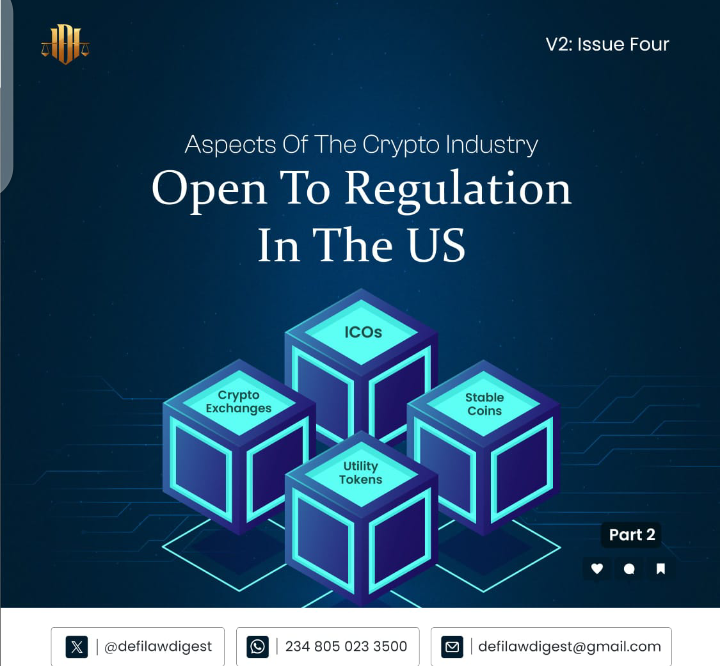By Ayomide Ogunsakin
In last week’s Issue, we talked about how some areas of the industry are regulated in the U.S.
In this Issue, we delve into more of these aspects already being regulated.
1. 𝙎𝙏𝘼𝘽𝙇𝙀𝘾𝙊𝙄𝙉𝙎
These are tokens pegged to fiat currencies, like $USDT and $BUSD.
Following crypto’s exponential growth, the use of stablecoins has also surged, since they’re believed to mitigate the volatility of trading crypto.
However, these tokens have also attracted regulatory measures.
For instance, Facebook’s proposed stablecoin, Libra—which aimed to enable anyone, anywhere to transact money over the internet with a host of fiat currencies to ensure stability of its price—faced regulatory scrutiny due to concerns about its potential impact on global financial stability.
Regulators expressed worries about Libra’s potential to disrupt monetary systems and consumer protection and although the project failed in 2019, this scrutiny highlighted the need for clear rules for stablecoins, especially those proposed by large tech companies.
A more recent instance showing why stablecoins may need laws can be observed from the collapse of Terra-Luna UST, back in May 2022.
Tether ($USDT), the most popular stablecoin, also faced a fine of $41 million from the Commodities and Futures Trading Commission (CFTC), and another settlement of $18.5 million with the New York Attorney General in 2021, over allegations of misrepresented reserves.
2. 𝙐𝙏𝙄𝙇𝙄𝙏𝙔 𝙏𝙊𝙆𝙀𝙉𝙎
Also called app coins, these tokens offer future access to a company’s product or service, but they do not give ownership rights or dividend claims in the company.
Instead, they allow access to specific functionalities in a platform or an ecosystem, and investors buy into them for their utility, value or for other speculative reasons like a future increase in the token’s price—which shows why they have attracted regulatory attention, to maintain investor protection.
The key determinants for whether a token here falls under U.S securities law often depends on its specific features and the manner in which it is offered or sold, following the Howey Test.
Thus, regulation here may follow different scenarios:
→ A utility token may not be deemed a security if it doesn’t follow the Howey Test like tokens with clear utility on functional platforms, where investors are not led to expect profits through the efforts of others;
→ It may be “hybrid,” having both utility and investment characteristics, in which case the SEC assesses them on a case-by-case basis to decide whether or not to view them as securities.
→ Where the SEC deems a utility token as a security or a token offering as “sale of unregistered securities”, it may be regulated by enforcement actions against the issuer, to ensure that securities regulations such as the KYC requirements are complied with;
→ The SEC may also issue documents or statements clarifying its stance on utility tokens, to help crypto developers and organizations issuing them to stay abreast of and ensure compliance with U.S securities regulations.
3. 𝘿𝙀𝘾𝙀𝙉𝙏𝙍𝘼𝙇𝙄𝙕𝙀𝘿 𝘼𝙐𝙏𝙊𝙉𝙊𝙈𝙊𝙐𝙎 𝙊𝙍𝙂𝘼𝙉𝙄𝙕𝘼𝙏𝙄𝙊𝙉𝙎 (𝘿𝘼𝙊𝙨)
DAOs are entities managed wholly or partly by decentralized computer programs, with voting and finances handled through a blockchain, controlled by members, and void of central authority.
The first thing to note about DAO regulation is that their decentralized nature may make it difficult to assign traditional legal responsibilities to their members.
However, legal treatment would likely depend on the specific activities they engage in, and possible future regulations may target governance or legal liability of members.
A prominent occurrence that raised significant questions about the legal status and regulation of DAOs was the launch of one of the earliest and most popular DAOs, “The DAO” in 2016.
The DAO was a decentralized VC fund that allowed investors to vote on and fund Ethereum-based projects.
But that same year, a vulnerability in its smart contract was exploited, leading to a drain of over 3.6M $ETH, worth about $60M at the time, of investors’ funds.
Presently, DAOs are of two kinds:
i. Legal DAOs which allow regulation of some aspects of the DAO’s quorum and follow cybersecurity rules.
ii. DAOs not covered by any legal framework, which is the more common and fully decentralized variant where members or token holders have the rights to govern themselves and consensually make decisions on the project.
Since 2021, three U.S states have passed legislation viewing DAOs as legal entities: Wyoming, Vermont and Tennessee.
Vermont was the first state to design a Limited Liability Company (LLC) for blockchain companies with DAOs in 2018, and then Wyoming later became the first state to expressly refer to DAOs as LLCs, in 2021.
Tennessee also issued a similar law in April 2022.
Bi-partisan bills recognizing DAOs as legal entities and creating frameworks for their regulation are also pending in the U.S Congress.
Additionally, the SEC may take legal action against DAOs that issue tokens deemed to be unregistered securities, or engage in fraudulent activities.
DAO participants could also be required to report their income and transactions for tax purposes under U.S tax laws managed by the Internal Revenue Service (IRS).
All these developments attest to the fact that the regulatory landscape of the crypto industry is rapidly evolving, particularly in the U.S.
The current SEC Chair, Gary Gensler, once made a statement which reflects the mind of the SEC and explains the aggressive regulatory moves they have taken so far:
“When a new technology comes along, our existing laws don’t just go away.”
However, the arbitrariness with which the SEC has been taking action is not very favourable.
As crypto keeps evolving, adaptable and properly tailored laws to ensure investor protection, aid the industry’s ability to flourish, and not stifle the innovation it offers, should be proposed.
Ayomide Ogunsakin, the brain behind the DeFi Law Digest, is a law undergraduate at the Obafemi Awolowo University (OAU), Ile-Ife. She can be reached through email: defilawdigest@gmail.com
Dear readers, we really need your support to keep on serving you with authoritative, truthful, and juicy stories everyday. For your support, please reach out to the editor @gavelinternational66@gmail.com

